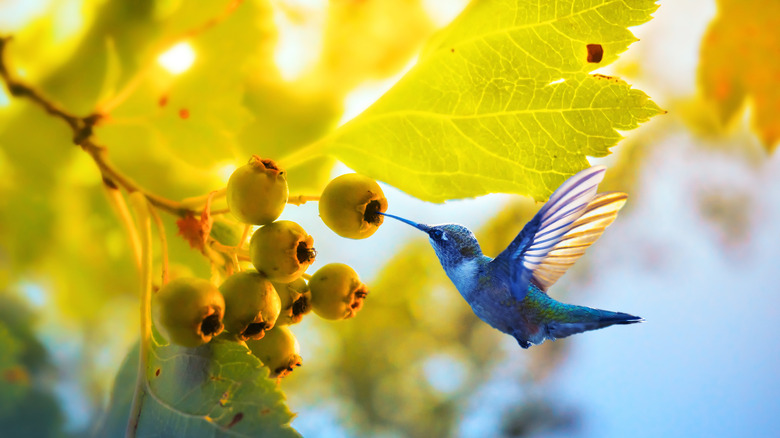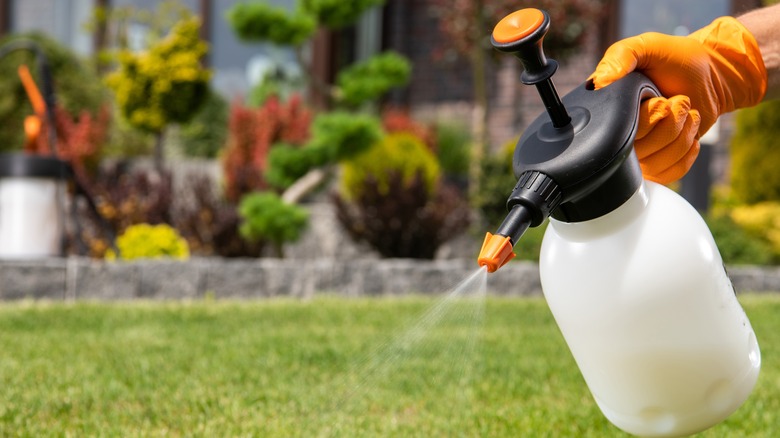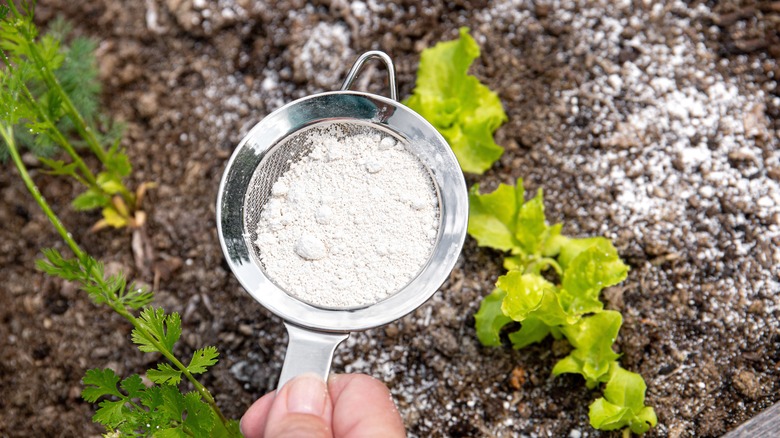The Pest Control Mistake That's Driving Hummingbirds Away From Your Yard
There is something amazing about glimpsing a hummingbird in your yard. With their shiny feathers, their itty-bitty size, and their ever-moving wings — hummingbirds are truly unique in every way and add an enjoyable element to your flower garden. If you love seeing these wondrous creatures around your home, then there is one outdoor maintenance task you should probably forgo: Applying pesticides. While certain lawn décor can cause hummingbirds to avoid your yard, pest control products are worse offenders because they can harm wildlife like hummingbirds in the process of keeping bugs, rodents, and weeds at bay. If these small birds ingest neonicotinoid pesticides, their metabolisms can suffer. Not only may this drive them away from your garden, but it can also have adverse health impacts.
Hummingbirds have extremely fast metabolisms to accommodate their lifestyle. Their little hearts beat around 1,200 beats per minute, and they have to consistently ingest sugar to sustain their energy levels, which is why their metabolism is almost 80 times higher than humans. Because their wings move so quickly (around 60–80 beats each second), these birds are continuously feeding on nectar-yielding blooms. This keeps them healthy and allows them to maintain the correct blood sugar levels to ensure their success as a species. Unfortunately, many leading pest control products contain neonicotinoids, which are detrimental to hummingbirds because they can slow down the birds' metabolisms if ingested. Here are the specifics on how neonicotinoid pesticides can impact hummingbirds and what to use instead.
Neonicotinoid pesticides can harm hummingbirds' natural cycles
A 2021 study published in the Scientific Reports journal has shown that ruby-throated hummingbirds who absorbed neonicotinoid pesticides into their systems saw a decrease in metabolic rates of up to 25% just a few hours after they came into contact with the compound. When this happens, the hummingbird could experience a marked drop in energy production, which means it can't properly feed or metabolize sugar. This tiny animal's system isn't equipped to handle a metabolic decrease of this magnitude, and it can affect how they survive in nature.
Common pest control products that use neonicotinoids include ones from brands like Lawn and Garden Products, Inc., The Scotts Company, Valent U.S.A., and Bayer Advanced, which produce a vast range of pesticides used to keep garden bugs in check. Researchers found that these types of products can negatively impact hummingbirds if they visit flowers that contain pesticide residues, and while the research only noted effects from a few hours of contact, Associate Professor Ken Welch, a leading hummingbirds expert, told the University of Toronto that "theoretically, there could be a long-term impact on the central nervous system."
Opt for non-toxic methods to keep your yard pest-free
Fortunately, you can keep pests out of your yard and away from your hummingbird feeders without harming the birds themselves. Products that contain permethrin, like the brand Perky-Pet AntGuard, can deter annoying insects from feeding on any sugar water you leave out and won't make hummingbirds sick. However, permethrin is toxic to all insects and can kill beneficial species like bees and butterflies. Ant moats, nectar guards for feeders, and switching standard feeders to saucers are some safer ways to deter pests like wasps and ants. Easy hacks to keep wasps away include leaving vinegar around your yard. To protect plants from pests, you can try natural strategies like sprinkling diatomaceous earth or create DIY pesticide sprays from household ingredients like chili. Other eco-friendly ways to keep bugs out of your garden include good soil management, roguing, and crop rotation for vegetables.
If mosquitoes are an issue, options like the Mosquito Magnet trap can deter pesky skeeters and won't bother your hummingbirds. Neem oil can keep everything from aphids to thrips and whiteflies away, and according to the National Pesticide Information Center, it's virtually harmless to both your plants and any birds that hang around your garden. These species also help with pest control and pollination — which are two benefits of attracting hummingbirds to your garden. Keep them safe by avoiding pesticides, and they will assist in keeping your yard blooming and thriving with their visits. Plus, it's always nice to see a hummingbird taking advantage of your flowers, especially if you're an avid bird-watcher.


